英语修辞小结
英语中的修辞手法总结
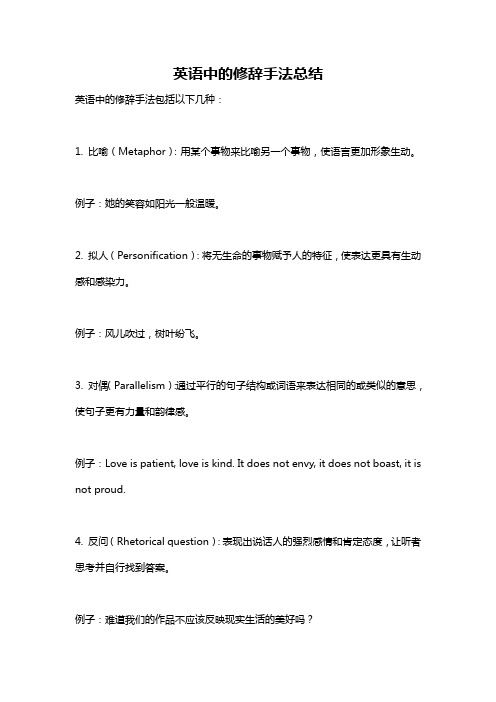
英语中的修辞手法总结
英语中的修辞手法包括以下几种:
1. 比喻(Metaphor):用某个事物来比喻另一个事物,使语言更加形象生动。
例子:她的笑容如阳光一般温暖。
2. 拟人(Personification):将无生命的事物赋予人的特征,使表达更具有生动感和感染力。
例子:风儿吹过,树叶纷飞。
3. 对偶(Parallelism):通过平行的句子结构或词语来表达相同的或类似的意思,使句子更有力量和韵律感。
例子:Love is patient, love is kind. It does not envy, it does not boast, it is not proud.
4. 反问(Rhetorical question):表现出说话人的强烈感情和肯定态度,让听者思考并自行找到答案。
例子:难道我们的作品不应该反映现实生活的美好吗?
5. 比较(Comparison):通过将两个不同的事物进行类比,使得听者或读者更容易理解某个观点。
例子:她跑得像一只兔子一样快。
以上是英语中常见的五种修辞手法,当然还有其他一些较少使用的修辞手法,如反语、夸张、卡里加里(Cacophony)等。
这些修辞手法都可以让语言更生动、更有表现力。
英语之修辞小结
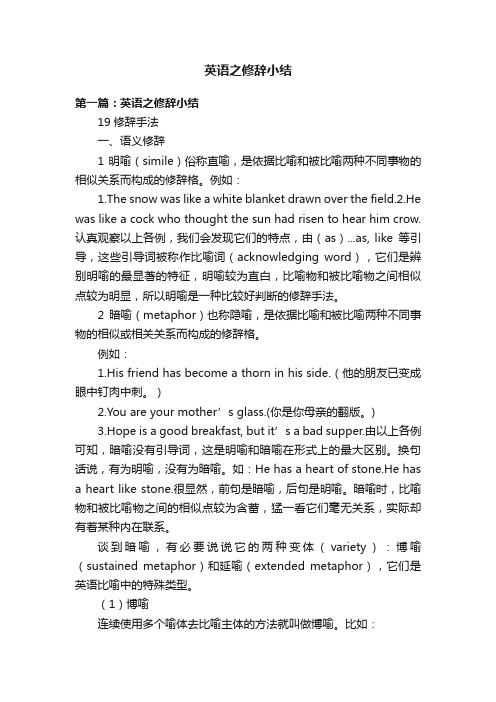
英语之修辞小结第一篇:英语之修辞小结19修辞手法一、语义修辞1明喻(simile)俗称直喻,是依据比喻和被比喻两种不同事物的相似关系而构成的修辞格。
例如:1.The snow was like a white blanket drawn over the field.2.He was like a cock who thought the sun had risen to hear him crow.认真观察以上各例,我们会发现它们的特点,由(as)...as, like等引导,这些引导词被称作比喻词(acknowledging word),它们是辨别明喻的最显著的特征,明喻较为直白,比喻物和被比喻物之间相似点较为明显,所以明喻是一种比较好判断的修辞手法。
2暗喻(metaphor)也称隐喻,是依据比喻和被比喻两种不同事物的相似或相关关系而构成的修辞格。
例如:1.His friend has become a thorn in his side.(他的朋友已变成眼中钉肉中刺。
)2.You are your mother’s glass.(你是你母亲的翻版。
)3.Hope is a good breakfast, but it’s a bad supper.由以上各例可知,暗喻没有引导词,这是明喻和暗喻在形式上的最大区别。
换句话说,有为明喻,没有为暗喻。
如:He has a heart of stone.He has a heart like stone.很显然,前句是暗喻,后句是明喻。
暗喻时,比喻物和被比喻物之间的相似点较为含蓄,猛一看它们毫无关系,实际却有着某种内在联系。
谈到暗喻,有必要说说它的两种变体(variety):博喻(sustained metaphor)和延喻(extended metaphor),它们是英语比喻中的特殊类型。
(1)博喻连续使用多个喻体去比喻主体的方法就叫做博喻。
比如:There again came out the second flash, with the spring of a serpent and the shout of a fiend, looked green as an emerald, and the reverberation was stunning.(爆发了第二次闪电,她像蛇一样蜿蜒,如魔鬼般嘶叫,像翠玉般碧绿,轰隆隆震耳欲聋。
英文修辞手法介绍
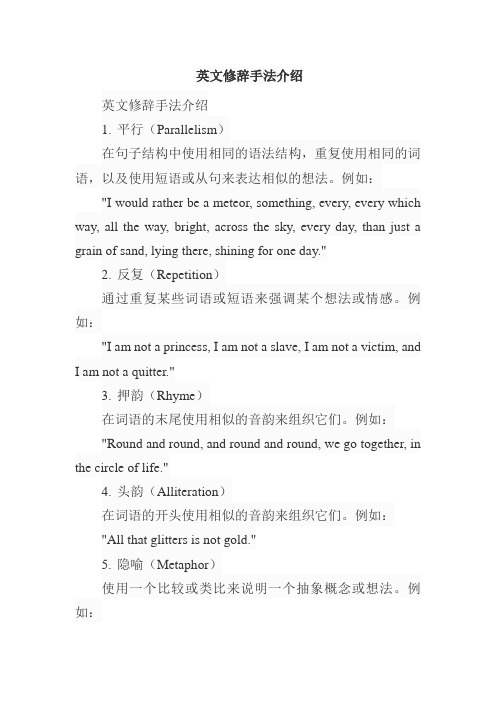
英文修辞手法介绍英文修辞手法介绍1. 平行(Parallelism)在句子结构中使用相同的语法结构,重复使用相同的词语,以及使用短语或从句来表达相似的想法。
例如:"I would rather be a meteor, something, every, every which way, all the way, bright, across the sky, every day, than just a grain of sand, lying there, shining for one day."2. 反复(Repetition)通过重复某些词语或短语来强调某个想法或情感。
例如:"I am not a princess, I am not a slave, I am not a victim, andI am not a quitter."3. 押韵(Rhyme)在词语的末尾使用相似的音韵来组织它们。
例如:"Round and round, and round and round, we go together, in the circle of life."4. 头韵(Alliteration)在词语的开头使用相似的音韵来组织它们。
例如:"All that glitters is not gold."5. 隐喻(Metaphor)使用一个比较或类比来说明一个抽象概念或想法。
例如:"He is a lion in battle."6. 明喻(Simile)使用像“像”或“如同”这样的词语来比较两个不同的事物或概念。
例如:"She sings like a bird."7. 反问(Rhetorical question)使用一个问题来表达一个陈述或观点,而不是提出真正的问题。
英语修辞手法总结

Lesson one1 We can batten down and ride it out.—metaphor2. Wind and rain now wiped the house. ----metaphor(暗喻)3 Everybody out the back door to the cars!--elliptical sentence (省略句)4. The children went from adult to adult like buckets in a fire brigade. ----simile (明喻)5. But the cars wouldn’t start; the electrical systems had been killed by water. personification(拟人)6. The wind sounded like the roar of a train passing a few yards away. -----simile7. …it seized a 600,00 gallon Gulfport oil tan k and dumped it 3.5 miles away. ----personification(拟人)8 Telephone poles and 20-inch-thick pines cracked like guns as the winds snapped them.-simile9 Several vacationers at the luxurious Richelieu Apartments there held a hurricane party to watch the storm from their spectacular vantagepoint--transferred epithet10. Richelieu Apartments were smashed apart as if by a gigantic fist, and 26 people perished. 明喻11. Strips of clothing festooned the standing trees, and blown down power lines coiled like black spaghetti over the roads----metaphor; simile12. …the Salvation Army’s canteen trucks and Red Cross volunteers and staffers were going wherever possible to distribute hot drinks, food, clothing and bedding.Lesson two Marrakech1 The little crowd of mourners -- all men and boys, no women--threaded their way across the market place between the piles of pomegranates and the taxis and the camels, walling a short chant over and over again. (Elliptical sentence省略句)2 提喻or are they merely a kind of undifferentiated brown stuff, about as individual as bees or coral insects?3 押头韵They rise out of the earth, they sweat and starve for a few years, and then they sink back into the nameless mounds of the graveyard (Para 3)4间接请求I could eat some of that bread.5夸张移就暗喻A carpenter sits cross-legged at a prehistoric lathe, turning chair-legs at lightning speed.(Transferred epithet移就Metaphor暗喻)6移就暗喻Instantly, from the dark holes all round, there was a frenzied rush of Jews. (Transferred epithet 移就)7 类比in just the same way, a couple of hundred years ago, poor old women used to be burned for witchcraft when they could not even work enough magic to get themselves a square meal.7 提喻still, a white skin is always fairly conspicuous.8 明喻long lines of women, bent double like inverted capital Ls.9 暗喻she accepted her status as an old woman, that is to say as a beast of burden.10 拟声词Onomatopoeia as the strokes flew northward the Negroes were marching southward -a long, dusty column, infantry, screw- gun batteries, and then more infantry, four or five thousand men in all, winding up the road with a clumping of boots and a clatter of iron wheels.11 明喻their feet squashed into boots that looks like blocks of wood…Simile12 省略句Not hostile, not contemptuous, not sullen, not even inquisitive13 明喻And really it was like watching a flock of cattle to see the long column, a mile or two miles of armed men, flowing peacefully up the road, while the great white birds drifted over them in the opposite direction, glittering like scrapes of paper.Lesson threeMetaphor(暗喻)1 the conversation had swung from Australian convicts of the 19th century to the english peasants of the 12th century.2 the conversation was on wings.3.And no one has any idea where it will go as it meander or leaps and sparkles or just glows .——mixed metaphor4The fact that their marriages may be on the rocks,or that their love affairs have been broken or even that they got out of bed on the wrong side is simply not a concern.——metaphor【1.on the rock 为英语习语,这里引用了隐喻的修辞手法,把婚姻比喻成触礁的船只】【2.to get out of the bed on the wrong side 也是英语习语。
英语修辞手法总结
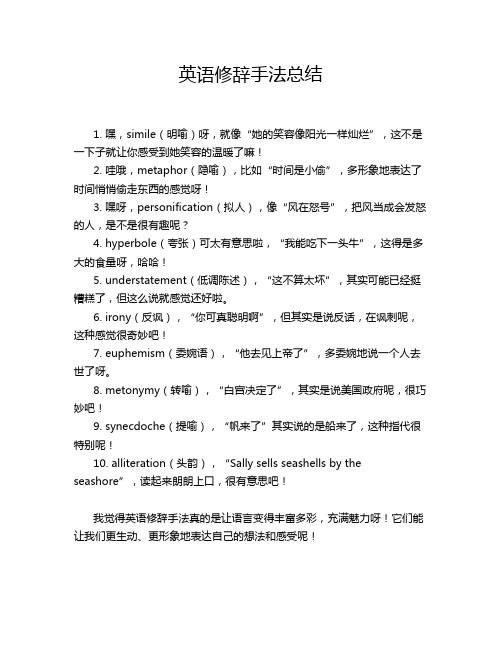
英语修辞手法总结
1. 嘿,simile(明喻)呀,就像“她的笑容像阳光一样灿烂”,这不是一下子就让你感受到她笑容的温暖了嘛!
2. 哇哦,metaphor(隐喻),比如“时间是小偷”,多形象地表达了时间悄悄偷走东西的感觉呀!
3. 嘿呀,personification(拟人),像“风在怒号”,把风当成会发怒的人,是不是很有趣呢?
4. hyperbole(夸张)可太有意思啦,“我能吃下一头牛”,这得是多大的食量呀,哈哈!
5. understatement(低调陈述),“这不算太坏”,其实可能已经挺糟糕了,但这么说就感觉还好啦。
6. irony(反讽),“你可真聪明啊”,但其实是说反话,在讽刺呢,这种感觉很奇妙吧!
7. euphemism(委婉语),“他去见上帝了”,多委婉地说一个人去世了呀。
8. metonymy(转喻),“白宫决定了”,其实是说美国政府呢,很巧妙吧!
9. synecdoche(提喻),“帆来了”其实说的是船来了,这种指代很特别呢!
10. alliteration(头韵),“Sally sells seashells by the seashore”,读起来朗朗上口,很有意思吧!
我觉得英语修辞手法真的是让语言变得丰富多彩,充满魅力呀!它们能让我们更生动、更形象地表达自己的想法和感受呢!。
英语中的修辞手法分析

英语中的修辞手法分析修辞手法是指在表达中使用一些艺术手法,以达到增强语言表达力、引起读者情感共鸣、达到修辞效果的目的。
在英语写作中,修辞手法的运用可以使文章更加生动有趣,让读者对文章产生深入印象。
本文将分析英语中常见的一些修辞手法,并举例说明其运用。
一、比喻(Metaphor)比喻是一种常见的修辞手法,通过将一个事物与另一个事物进行类比,以便让读者更好地理解所描述的对象或情感。
比如,“She is a rosein the garden of love.”(她是爱之花园中的一朵玫瑰),这里将“她”比作“花园中的一朵玫瑰”,以形象地表达出对她美丽和爱的赞美。
二、拟人(Personification)拟人是将无生命的事物或抽象概念赋予人的特质或行为,以便使描述更加形象生动。
例如,“The wind howled in the darkness.”(风在黑暗中咆哮)这里将风与人的行为“咆哮”联系起来,使得描写更加富有感情和形象。
三、反问(Rhetorical Question)反问是一种修辞手法,在陈述问题时使用疑问句的方式,不要求回答,而是用来增强说服力和引起读者注意。
例如,“Can you imagine a world without music?”(你能想象没有音乐的世界吗?)这种反问引起读者对音乐的重要性的思考,并在不同程度上影响读者情感。
四、排比(Parallelism)排比是通过使用类似的结构或语法来强调一系列相关的概念或事件,以便增强表达的力度和节奏感。
例如,“They saw. They conquered. They left a legacy.”(他们见证了,他们征服了,他们留下了遗产)此处使用并列的结构,使得表达更加明确和有力。
五、夸张(Hyperbole)夸张是一种修辞手法,通过过分强调某一情感或观点,以便吸引读者的注意和共鸣。
例如,“I've told you a million times.”(我已经告诉你一百万次了)这里的“一百万次”明显是夸张的说法,但它强调了作者重复告诉的次数,以表达出对对方的焦急与无奈。
英语修辞作用总结
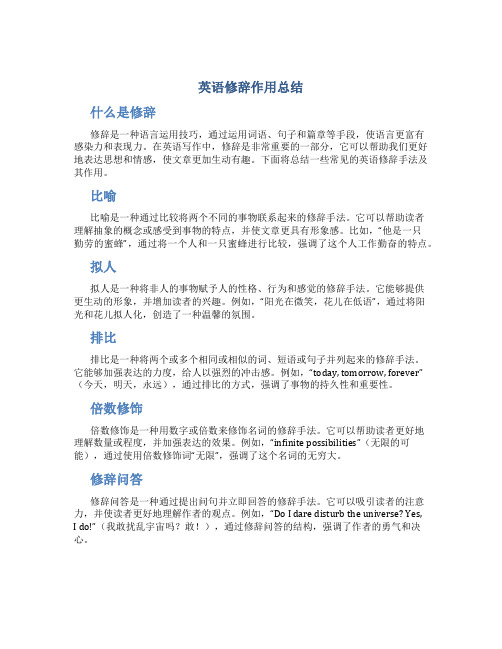
英语修辞作用总结什么是修辞修辞是一种语言运用技巧,通过运用词语、句子和篇章等手段,使语言更富有感染力和表现力。
在英语写作中,修辞是非常重要的一部分,它可以帮助我们更好地表达思想和情感,使文章更加生动有趣。
下面将总结一些常见的英语修辞手法及其作用。
比喻比喻是一种通过比较将两个不同的事物联系起来的修辞手法。
它可以帮助读者理解抽象的概念或感受到事物的特点,并使文章更具有形象感。
比如,“他是一只勤劳的蜜蜂”,通过将一个人和一只蜜蜂进行比较,强调了这个人工作勤奋的特点。
拟人拟人是一种将非人的事物赋予人的性格、行为和感觉的修辞手法。
它能够提供更生动的形象,并增加读者的兴趣。
例如,“阳光在微笑,花儿在低语”,通过将阳光和花儿拟人化,创造了一种温馨的氛围。
排比排比是一种将两个或多个相同或相似的词、短语或句子并列起来的修辞手法。
它能够加强表达的力度,给人以强烈的冲击感。
例如,“today, tomorrow, forever”(今天,明天,永远),通过排比的方式,强调了事物的持久性和重要性。
倍数修饰倍数修饰是一种用数字或倍数来修饰名词的修辞手法。
它可以帮助读者更好地理解数量或程度,并加强表达的效果。
例如,“infinite possibilities”(无限的可能),通过使用倍数修饰词“无限”,强调了这个名词的无穷大。
修辞问答修辞问答是一种通过提出问句并立即回答的修辞手法。
它可以吸引读者的注意力,并使读者更好地理解作者的观点。
例如,“Do I dare disturb the universe? Yes,I do!”(我敢扰乱宇宙吗?敢!),通过修辞问答的结构,强调了作者的勇气和决心。
转喻转喻是一种将一个概念与另一个概念进行类比的修辞手法。
它可以帮助读者更好地理解抽象的概念,并使文章更具有说服力。
例如,“Time is money”(时间就是金钱),通过将时间和金钱进行类比,强调了时间的珍贵和重要性。
反问反问是一种提出问题,但不期望回答的修辞手法。
高级英语中的修辞手法总结带课文中例句
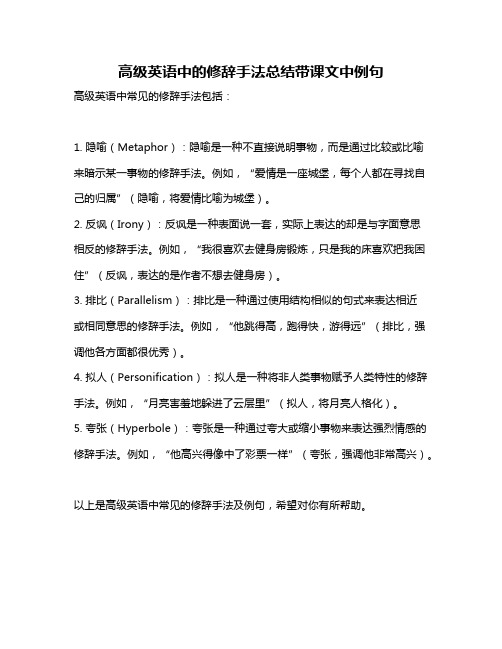
高级英语中的修辞手法总结带课文中例句
高级英语中常见的修辞手法包括:
1. 隐喻(Metaphor):隐喻是一种不直接说明事物,而是通过比较或比喻来暗示某一事物的修辞手法。
例如,“爱情是一座城堡,每个人都在寻找自己的归属”(隐喻,将爱情比喻为城堡)。
2. 反讽(Irony):反讽是一种表面说一套,实际上表达的却是与字面意思
相反的修辞手法。
例如,“我很喜欢去健身房锻炼,只是我的床喜欢把我困住”(反讽,表达的是作者不想去健身房)。
3. 排比(Parallelism):排比是一种通过使用结构相似的句式来表达相近
或相同意思的修辞手法。
例如,“他跳得高,跑得快,游得远”(排比,强调他各方面都很优秀)。
4. 拟人(Personification):拟人是一种将非人类事物赋予人类特性的修辞手法。
例如,“月亮害羞地躲进了云层里”(拟人,将月亮人格化)。
5. 夸张(Hyperbole):夸张是一种通过夸大或缩小事物来表达强烈情感的修辞手法。
例如,“他高兴得像中了彩票一样”(夸张,强调他非常高兴)。
以上是高级英语中常见的修辞手法及例句,希望对你有所帮助。
高级英语修辞总结

高级英语第一册修辞Mixed metaphor Metaphors(隐喻) Alliteration(首韵) Simile(明喻)Transferred epithet(移就)Synecdoche(题喻) Antithesis(对照)Parallelism(排比)Repetition(重复)Metonymy(借代)Personification(拟人)Euphemism(夸张)Lesson71. who ever know a Johnson with a quick tongue? (metaphor)2. She was determined to .....any disaster in her effort. (Personification)3. She put on some sunglasses.....of her nose and her chin.(Hyperbole夸张)4. ....perhaps a dog run over by ......enough to be kind of him.(Analogy类比)5. ....chin on chest,eyes on ground, feet in shuttle.(Hyperbole夸张)1. And she stops and tries to dig a well in the sand with her toe. (exaggeration)2. I feel my whole face warming from the heat waves it throws out .(exaggeration)3.“Maggie’s brain is like an elephant’s”.Wangero said ,laughing .(ironic)4.You did not even have to look close to see where hands pushing the dasher up anddown to make butter had left a kind of sink in the wood .(metaphor)5.“Mama,”Wangero said sweet as a bird .“can I have these old quilts?”(simile)Lesson141.It excel all forms of human wickedness...ferocious aggression (Hyperbole, paradox)2.But can you dout what our policy will be ? (rhetorical question)3.We have rid the earth of his shadow....from his yoke.(metaphor)4.Any man or states who fight on against ....will have our aid.(Antithesis)5.It is not for me to ...,but this i will say ...(inversion)6.With its clanking (onomatopoeia) , hell-clicking (assonance)7.Churchill ,he reverted to this theme, and I asked whether for him, the archanti-communist ,this was not bowing down in the House of common.(metaphor)8.If Hitler invaded Hell and would make at least a favorable reference to the Devil inthe House of Commons.(exaggeration)9.I see the Russian soldiers standing on the threshold of their native land ,guardingthe fields which their fathers have tilled from time immemorial.(Metaphor)10.I see the German bombers and fighters in the sky ,street smarting from many aBritish whipping to find what they believe is an easier and a safer prey.(assonance,periodic)11.We will never parley; we will never negotiate with Hitler or any of his gang. Weshall fight him by land, we shall fight him by sea, we shall fight him in the air.(Parallelism)12. But all this fades away before the spectacle which is now unfolding.(metaphor)13. After I tripped over it two or three times he told me to just call himHakim-a-barber .(metaphor)第二册Rhetorical:Lesson11 The fact that their marriages may be on the rocks,or that their love affairs have been broken or even that they got out of bed on the wrong side is simply not a concern.—metaphor,pun2 They are like the musketeers of Dumas who,although they lived side by side with each other,did not delve into,each other’s lives or the recesses of their thoughts and feeli ngs.—simile3 The Elizabethans blew on it as on a dandelion clock,and its seeds multiplied, and floated to the ends of the earth.—simile4 Even with the most educated and the most literate,the King’s English slips and slides in conversation.—metaphor ,alliteration5 When E.M.Forster writes of “the sinister corridor of our age,”we sit up at the vividness of the phrase,the force and even terror in the image.—metaphor6. … and no one has any idea where it will go as it meanders or leaps and sparkles or just gl ows. ---mixed-metaphor or metaphor7. The glow of the conversation burst into flames. ----metaphor8. I have an unending love affairs with dictionaries -----metaphor9. The conversation was on wings. ----metaphor10. The bother about teaching chimpanzees how to talk is that they will probably try to talk sense and so ruin all conversation. -----sarcasm反讽11. perhaps it is my upbring in english.....has a charm of its own-metaphor, exaggeration12. Is the phrase in Shakespeare? ----metonymy13. … that suddenl y the alchemy of conversation took place, and all at once there was a focus. ----metaphorLesson21 . Are they really the same flesh as you self ? (synecdoche, rhetorical question)2 A carpenter sitscross-legged at a prehistoric lathe,turning chair-legs at lightning speed.—Hyperbol3 Still,a white skin is always fairly conspicuous.—synecdoche4 And really it was like watching a flock of cattle to see the long column,a mile or two miles of armed men,flowing peacefully up the road,while the great white birds drifted over them in the opposite direction,glittering like scraps of paper.—simile5.Instantly, from the dark holes all round, there was a frenzied rush of Jews, many of them oldgrandfathers with flowing grey beards, all clamoring for a cigarette. -----transferred epithet6.If he calls himself a socialist thinks ahen he sees a black army marching past.(irony)1. The burying-ground is merely a huge waste of hummocky earth, like a derelict building-lot. -----simile2. They rise out of the earth, they sweat and starve for a few years, and then they sink back intothe nameless mounds of the graveyard and nobody notices that they are gone. -----alliteration3. ..and sore-eyed children cluster everywhere in unbelievable numbers, like clouds of flies. ----simile4. As the storks flew northward the Negroes were marching southward—a long,dusty column,infantry,screw-gun batteries,and then more infantry,four or five thousand men in all,winding up the road with a clumping of boots and a clatter of iron wheels.—onomatopoetic words symbolism5 Not hostile,not contemptuous,not sullen,not even inquisitive.—elliptical sentence6. This wretched boy, who is a French citizen and has therefore been dragged from the forest to scrub floors and catch syphilis in garrison towns, actually has feelings of reverence before a white skin. —-synecdoche提喻Lesson31 But this peaceful revolution of hope can’t became the prey of hostile power- metaphor2 Let every nation know,whether it wishes us well or ill,that we shall pay any price,bear anyburden,meet any hardship,support any friend,oppose any foe to assure the survival and the successof liberty.—parataxis consonance3 United,there is little we cannot do in a host of co-operative ventures.Divided,there is little wecan do,for we dare not meet a powerful challenge at odds and split asunder.—antithesis4 Let us never negotiate out of fear,but let us never fear to negotiate.—antithesis,5 All this will not be finished in the first one hundred days.—historical allusion,climax6 And so,my fellow Americans ask not what your country can do for you;ask what you can do for your country.—antithesis7 If a free society cannot help the many who are poor, it cannot save the few who are rich. -----antithesis8 And if a beachhead of co-operation m ay push back the jungle of suspicion…-----metaphor9 And let every other power know that this hemisphere intends to remain the master of its own house. -----metaphor10 The energy, the faith, the devotion which we bring to this endeavor will light our country and all who serve it, and the glow from that fire can truly light the world. -----extended metaphor1…in the past,those who foolishly sought power by riding the back of the tiger ended up inside.—metaphor2 We observe today not a victory of party but a celebration of freedom, symbolizing an end as well as a beginning, signifying renewal as well as change. ----parallelism3 Let both sides explore what problems unite us instead of belaboring those problems which divide us. -----antithesisWith a good cons cience our only sure reward, with history the final judge of our deeds… -----parallelism。
20种英语修辞手法整理
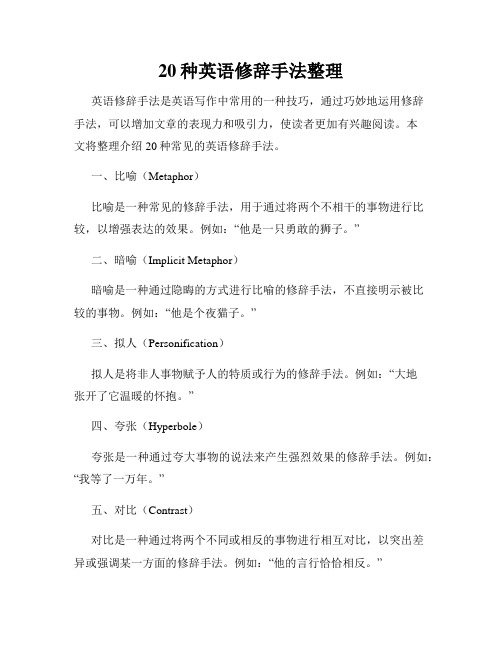
20种英语修辞手法整理英语修辞手法是英语写作中常用的一种技巧,通过巧妙地运用修辞手法,可以增加文章的表现力和吸引力,使读者更加有兴趣阅读。
本文将整理介绍20种常见的英语修辞手法。
一、比喻(Metaphor)比喻是一种常见的修辞手法,用于通过将两个不相干的事物进行比较,以增强表达的效果。
例如:“他是一只勇敢的狮子。
”二、暗喻(Implicit Metaphor)暗喻是一种通过隐晦的方式进行比喻的修辞手法,不直接明示被比较的事物。
例如:“他是个夜猫子。
”三、拟人(Personification)拟人是将非人事物赋予人的特质或行为的修辞手法。
例如:“大地张开了它温暖的怀抱。
”四、夸张(Hyperbole)夸张是一种通过夸大事物的说法来产生强烈效果的修辞手法。
例如:“我等了一万年。
”五、对比(Contrast)对比是一种通过将两个不同或相反的事物进行相互对比,以突出差异或强调某一方面的修辞手法。
例如:“他的言行恰恰相反。
”六、排比(Parallelism)排比是一种通过对句子或短语进行平行结构的修辞手法,以强调重点或增加语句的节奏感。
例如:“奋斗,拼搏,追求,努力。
”七、倒装(Inversion)倒装是一种颠倒语序的修辞手法,常常用于疑问句或为了强调某一部分。
例如:“Never have I seen such a beautiful sunset.”八、反问(Rhetorical Question)反问是一种用疑问句的形式表达肯定或否定的修辞手法,常用于强调某一观点或引起读者思考。
例如:“难道你不想成功吗?”九、比较(Comparison)比较是通过将两个事物进行对比,以凸显共同点或差异的修辞手法。
例如:“学习就像是爬山,充满了艰辛和挑战。
”十、设问(Hypophora)设问是一种在文章中提出问题,并在下文中进行回答的修辞手法,常用于引起读者的关注和思考。
例如:“你知道成功的秘诀是什么吗?答案很简单——努力。
高级英语修辞手法总结归纳

高级英语修辞手法总结归纳修辞是语言使用中的重要技巧,通过巧妙运用各种修辞手法,能使语言表达更为生动、有力或富有韵味。
以下是对常见的高级英语修辞手法的总结归纳:一、隐喻与明喻隐喻是将一个词或短语用来暗示另一个事物,而明喻则是直接将一个事物与另一个事物进行比较。
例如,“他像一只狮子一样勇猛”(明喻)和“爱情是一座城堡”(隐喻)。
二、拟人及拟物拟人是赋予非生物或抽象事物以人的特性,而拟物则是赋予人或动物以非生物的特性。
例如,“河流唱着轻快的歌曲”(拟人)和“他的怒火如野兽般狂暴”(拟物)。
三、排比与对偶排比是将三个或以上结构相似、意义相近的词、短语或句子并列使用,以增强语势。
对偶则是将意义相对或相反的词、短语或句子进行对比,以突出主题。
例如,“生命在于运动,死亡在于静止”(对偶)和“他跨越了山岭,穿越了沙漠,走过了平原”(排比)。
四、反复与交错反复是将相同的词、短语或句子重复使用,以强调某种情感或主题。
交错则是将不同的词、短语或句子相互交替使用,以达到特定的表达效果。
例如,“永远、永远、永远不要放弃”(反复)和“是与否,对与错”(交错)。
五、借代与提喻借代是用一个事物的某一部分来代替整体或其他部分,而提喻则是用整体来代替某一部分或用类属来代替个体。
例如,“我要用笔墨写下永恒”(借代)和“人是一本书”(提喻)。
六、反讽与戏谑反讽是通过说反话或正话反说来达到讽刺的效果,戏谑则是用幽默诙谐的语言来戏弄或嘲笑某人或某事。
例如,“他是一个天生的傻瓜”(反讽)和“爱情是人生的蜜糖”(戏谑)。
七、矛盾修辞法矛盾修辞法是将相互矛盾的概念或形象结合在一起,以引起读者的思考或表达复杂的情感。
例如,“孤独的狂欢”,“死亡的生命”。
八、头韵与脚韵头韵是使用相同或相似的音韵开头,脚韵是使用相同或相似的音韵结尾。
例如,“美丽的美女”(头韵)和“生活是一首歌”(脚韵)。
九、夸张与弱化夸张是通过夸大事实或形象来强调某种情感或主题,弱化则是通过缩小事实或形象来淡化某种情感或主题。
英语修辞手法总结资料讲解

英语修辞手法总结资料讲解英语修辞手法总结chapter seven figures of speech(I)修辞手法resemblance (or relationship)(相似)I.simile: 明喻1.difinition: A simile is a figure of speech in which two quite different things are compared because they appear to be similar in at least one characteristic. Simile is introduced by “like” or “as”for example:1). Beauty is as summer fruits, which are easy to corrupt … .(Francis Bacon)2). I know it helped put me at ease when I felt like the new kid at school at my first ecomonic summit in Ottawa in 1981 (Ronal Reagan)3). New China is like a red sun rising in the east. ( Edgar Snow)4). It is with words as with sunbeams-----the more they are condensed, the deeper they burn.阳光浓缩5). She spoke hurriedly, as if her heart had leaped into her throat at the boy’s words.(Thomas Hardy)In a simile there is uaually at least one similarity between the two things compared. But sometimes, the similarity may not be mentined, this kind of simile is called OPEN SIMILE.eg, The man is like a pig. But we can see another way of simile. The similarities are shown directly and specifically. This simile is called CLOSED SIMILE.eg. The man is as fast as a pig.2. function : simile owns a great effect on rhetorical functions,especially when it is used to describe or illustrated more vivid and some sophisticated theoretical ideas easier to understand.For example:1)Mother was short and plump and pretty. Her eyes were blue, and her brown hairwas like a bird’s smooth wings….2)The mothers stayed back in the kitchen washing and drying, putting things away,recrossing their traceless footsteps like the life time journeys of bees, measuring out the dry cocoa for breakfast3)He was ten feet long, thin as a curve, a muscled ribbon, brown as fruit-wood,soft-furred, alert. His face was fierce, small and pointed as a lizard’s; he would have made a good arrowhead. There was just a dot of chin, maybe two brown hairs’s width, and that the pure white fur began that spread down his underside. He had two black eyes I didn’t see any more than you see a widow. ( Annie Dillard’s weasel)4)Habit may be likenned to a cable;every day we weave a thread, and soon wecannot break it.5)Rise like lions after slumber 像雄师般奋起反抗In unvanquishable number---- - 亿万成群不可挡----Shake your chains to earth like dew 睡梦中锁链套身上----Which in sleep had fallen on you---- 摔掉它,化为灰烬You are many-----they are few. 他们一小撮,你们千万人(Percy Bysshy Shelley)6)The man who has not anything to boast of, but his illustrious ancestors, is like apotato----the only good belonging to him is under ground.(Overbury) (一个人如果只有以他的功勋卓著的先祖为自豪,而再没有什么可以值得自夸的话,那他就像个土豆,因为他唯一的好处只能是深埋于泥土中。
英语修辞总结
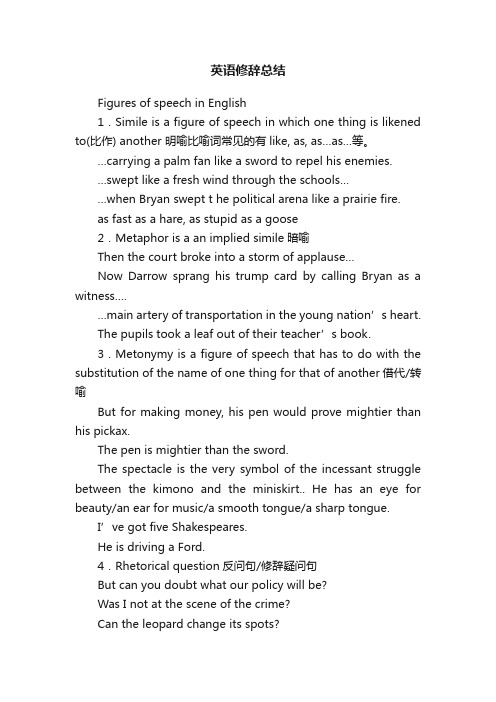
英语修辞总结Figures of speech in English1.Simile is a figure of speech in which one thing is likened to(比作) another 明喻比喻词常见的有like, as, as…as…等。
…carrying a palm fan like a sword to repel his enemies.…swept like a fresh wind through the schools……when Bryan swept t he political arena like a prairie fire.as fast as a hare, as stupid as a goose2.Metaphor is a an implied simile暗喻Then the court broke into a storm of applause…Now Darrow sprang his trump card by calling Bryan as a witness….…main artery of transportation in the young nation’s heart.The pupils took a leaf out of their teacher’s book.3.Metonymy is a figure of speech that has to do with the substitution of the name of one thing for that of another借代/转喻But for making money, his pen would prove mightier than his pickax.The pen is mightier than the sword.The spectacle is the very symbol of the incessant struggle between the kimono and the miniskirt.. He has an eye for beauty/an ear for music/a smooth tongue/a sharp tongue.I’ve got five Shakespeares.He is driving a Ford.4.Rhetorical question反问句/修辞疑问句But can you doubt what our policy will be?Was I not at the scene of the crime?Can the leopard change its spots?O, wind, if winter comes, can spring be far behind?5.Antithesis is the setting of contrasting phrases or statements opposite each other for emphasis 对照意义相反或相对的词、短语、句子出现在对称的位置上。
现代大学英语6修辞总结
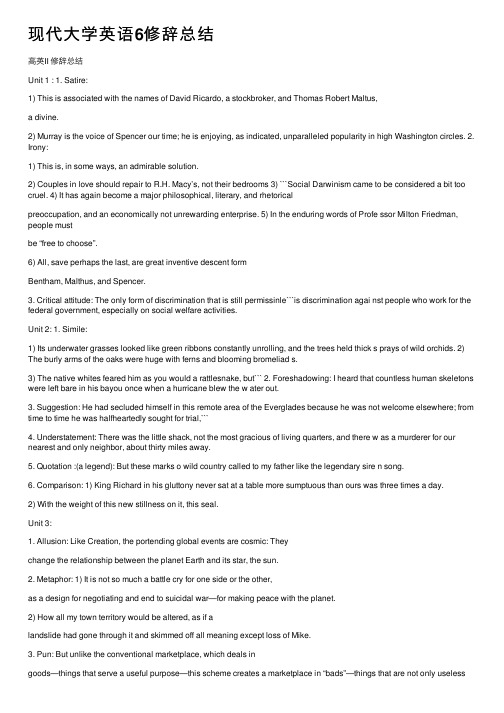
现代⼤学英语6修辞总结⾼英II 修辞总结Unit 1 : 1. Satire:1) This is associated with the names of David Ricardo, a stockbroker, and Thomas Robert Maltus,a divine.2) Murray is the voice of Spencer our time; he is enjoying, as indicated, unparalleled popularity in high Washington circles. 2. Irony:1) This is, in some ways, an admirable solution.2) Couples in love should repair to R.H. Macy’s, not their bedrooms 3) ```Social Darwinism came to be considered a bit too cruel. 4) It has again become a major philosophical, literary, and rhetoricalpreoccupation, and an economically not unrewarding enterprise. 5) In the enduring words of Profe ssor Milton Friedman, people mustbe “free to choose”.6) All, save perhaps the last, are great inventive descent formBentham, Malthus, and Spencer.3. Critical attitude: The only form of discrimination that is still permissinle```is discrimination agai nst people who work for the federal government, especially on social welfare activities.Unit 2: 1. Simile:1) Its underwater grasses looked like green ribbons constantly unrolling, and the trees held thick s prays of wild orchids. 2) The burly arms of the oaks were huge with ferns and blooming bromeliad s.3) The native whites feared him as you would a rattlesnake, but``` 2. Foreshadowing: I heard that countless human skeletons were left bare in his bayou once when a hurricane blew the w ater out.3. Suggestion: He had secluded himself in this remote area of the Everglades because he was not welcome elsewhere; from time to time he was halfheartedly sought for trial,```4. Understatement: There was the little shack, not the most gracious of living quarters, and there w as a murderer for our nearest and only neighbor, about thirty miles away.5. Quotation :(a legend): But these marks o wild country called to my father like the legendary sire n song.6. Comparison: 1) King Richard in his gluttony never sat at a table more sumptuous than ours was three times a day.2) With the weight of this new stillness on it, this seal.Unit 3:1. Allusion: Like Creation, the portending global events are cosmic: Theychange the relationship between the planet Earth and its star, the sun.2. Metaphor: 1) It is not so much a battle cry for one side or the other,as a design for negotiating and end to suicidal war—for making peace with the planet.2) How all my town territory would be altered, as if alandslide had gone through it and skimmed off all meaning except loss of Mike.3. Pun: But unlike the conventional marketplace, which deals ingoods—things that serve a useful purpose—this scheme creates a marketplace in “bads”—things that are not only uselessbut often deadly.Unit 4:1. Personification: Each of the trees on the place had an attitude and apresence—the elm looked serene and the oak threatening, the maples friendly, the hawthorn old and crabby.3. Alliteration: She did not ask me—was it delicacy or disapproval?4. (通感):1) All afternoon while the men were gone I was full of happyenergy. (happy 实际上是⽤来修饰“我”)4. Parallel structure: Against the belief in the all-encompassing power of single explanation, again st```, against```(unit 5) Unit 6:1. Pseudo-serious tone: The creams, slightly muffled by oil,```as though torture were being carried out but they didn’t last long: It was all over rather suddenly, and, his legs released, the pig righted himself. 2. Biblic al allusion:1) From then until the time of his death I held the pig steadily in the bowl of my mind;2) The pig’s lot and mine inextricably bound now, as though the rubber tube were the silver cord.3. Alliteration: But even so, there was a directness and dispatch about animal burial.4. Symbolize: He had evidently become precious to me, not that he represented a distant nourishm ent in a hungry time, but that he had suffered in a suffering world.(对作者来说,the suffering of the pig symbolizes the suffering of human beings.)5. Humorous:1) The frequency of our trips down the footpath through the orchardto the pig yard delighted him, although he suffers greatly arthritis, moves with difficulty, and would be bedridden if he could find anyone willing to serve him meals on the tray.2) I have come to believe that there is in hostesses a special power ofdivination, and that they deliberately arrange dinners to coincide with pig failure or some other sor t of failure.(humorously accuses the hostesses )3) This was slapstick—the sort of dramatic treatment that instantlyappealed to my old dachund, Fre,```presided at the interment. 4) This uncertainty afflicts me with a sense of personal determination; if I were in decent health I would know how many nights I had sat up with a pig.6. Parallel structure:1) ```with the fog shutting in every night, scaling for a few hours inmid-day, then creeping back again at dark, drifting in first over the trees on the point, then```2) ```everything about the last scene seemed overwritten—the dismalsky, the shabby woods, the imminence of rain, the worm``。
大学英语中修辞手法归纳总结
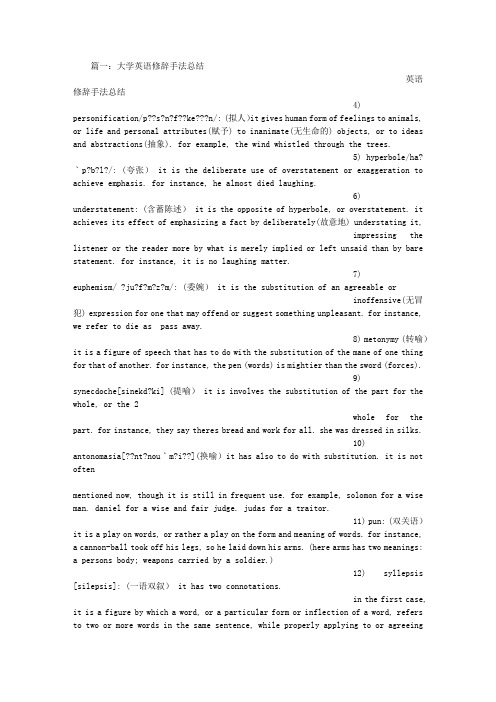
篇一:大学英语修辞手法总结英语修辞手法总结4)personification/p??s?n?f??ken/: (拟人)it gives human form of feelings to animals, or life and personal attributes(赋予) to inanimate(无生命的) objects, or to ideas and abstractions(抽象). for example, the wind whistled through the trees.5) hyperbole/ha?ˋp?b?l?/: (夸张) it is the deliberate use of overstatement or exaggeration to achieve emphasis. for instance, he almost died laughing.6) understatement: (含蓄陈述) it is the opposite of hyperbole, or overstatement. it achieves its effect of emphasizing a fact by deliberately(故意地) understating it, impressing the listener or the reader more by what is merely implied or left unsaid than by bare statement. for instance, it is no laughing matter.7)euphemism/ ?ju?f?m?z?m/: (委婉) it is the substitution of an agreeable orinoffensive(无冒犯) expression for one that may offend or suggest something unpleasant. for instance, we refer to die as pass away.8) metonymy (转喻)it is a figure of speech that has to do with the substitution of the mane of one thing for that of another. for instance, the pen (words) is mightier than the sword (forces).9)synecdoche[sinekd?ki] (提喻) it is involves the substitution of the part for the whole, or the 2whole for the part. for instance, they say theres bread and work for all. she was dressed in silks.10)antonomasia[??nt?nouˋm?i??](换喻)it has also to do with substitution. it is not oftenmentioned now, though it is still in frequent use. for example, solomon for a wise man. daniel for a wise and fair judge. judas for a traitor.11) pun: (双关语)it is a play on words, or rather a play on the form and meaning of words. for instance, a cannon-ball took off his legs, so he laid down his arms. (here arms has two meanings:a persons body; weapons carried by a soldier.)12) syllepsis [silepsis]: (一语双叙) it has two connotations.in the first case, it is a figure by which a word, or a particular form or inflection of a word, refers to two or more words in the same sentence, while properly applying to or agreeingwith only on of them in grammar or syntax(句法). for example, he addressed you and me, and desired us to follow him. (here us is used to refer to you and me.)in the second case, it a word may refer to two or more words in the same sentence. for example, while he was fighting , and losing limb and mind, and dying, others stayed behind to pursue education and career. (here to losing ones limbs in literal; to lose ones mind is figurative, and means to go mad.)13)zeugma[zju:gm?]: (轭式搭配) it is a single word which is made to modify or to govern two or more words in the same sentence, wither properly applying in sense to only one of them, or applying to them in different senses. for example, the sun shall not burn you by day, nor the moon by night. (here noon is not strong enough to burn) 14) irony/ ˋa?r?n?/: (反语) it is a figure of speech that achieves emphasis by saying the opposite of what is meant, the intended meaning of the words being the opposite of their usual sense. for instance, we are lucky, what you said makes me feel real good.16) sarcasm: (讽刺) it sarcasm is a strong form of irony. it attacks in a taunting and bitter manner, and its aim is to disparage, ridicule and wound the feelings of the subject attacked. for example, laws are like cobwebs, which may catch small flies, but let wasps break through.17) paradox: (似非而是的隽语) it is a figure of speech consisting of a statement or proposition which on the face of it seems self-contradictory, absurd or contrary to 3established fact or practice, but which on further thinking and study may prove to be true, well-founded, and even to contain a succinct point. for example more haste, less speed.19) antithesis: (对照) it is the deliberate arrangement of contrasting words or ideas in balanced structural forms to achieve emphasis. for example, speech is silver; silence is golden.20) epigram: (警句) it states a simple truth pithily(有利地) and pungently(强烈地). it isusually terse and arouses interest and surprise by its deep insight into certain aspects of human behavior or feeling. for instance, few, save the poor, feel for the poor.21) climax: (渐进)it is derived from the greek word for ladder and implies the progression of thought at a uniform or almost uniform rate of significance or intensity, like the steps ofa ladder ascending evenly. for example, i came, i saw, i conquered.22) anti-climax or bathos: (突降)it is the opposite of climax. it involves stating ones thoughts in a descending order of significance or intensity, from strong to weak, from weightyto light or frivolous. for instance, but thousands die, without or this or that, die, and endow(赋予) a college, or a cat.23) apostrophe:(顿呼) in this figure of speech, a thing, place, idea or person (dead or absent) is addressed as if present, listening and understanding what is being said. for instance, england! awake! awake! awake!24) transferred epithet: (转类形容词) it is a figure of speech where an epithet (anadjective or descriptive phrase) is transferred from the noun it should rightly modify(修饰) to another to which it does not really apply or belong. for instance, i spent sleepless nights on my project.25) alliteration: (头韵) it has to do with the sound rather than the sense of words for effect. it is a device that repeats the same sound at frequent intervals(间隔) and since the sound repeated is usually the initial consonant sound, it is also called front rhyme. for instance, the fair breeze blew, the white foam flew, the furrow followed free.26) onomatopoeia: (拟声) it is a device that uses words which imitate the sounds made by an object (animate or inanimate), or which are associated with or suggestive(提示的) of some action or movement4explanation version1一、什么是修辞格修辞格(figures of speech)是提高语言表达效果的语言艺术。
英语修辞手法总结
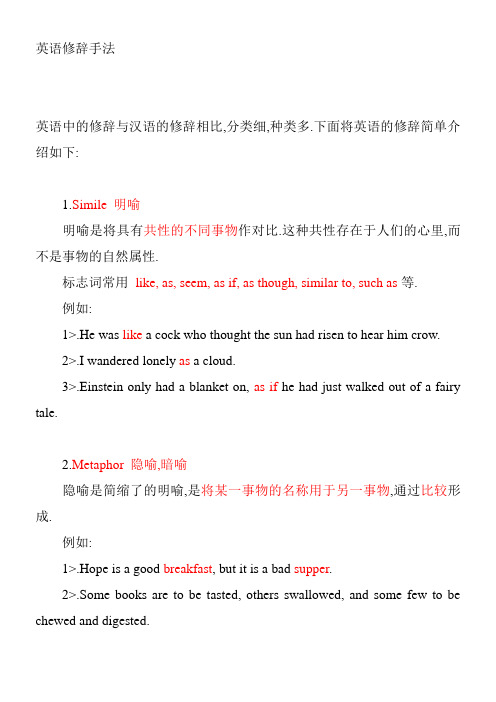
英语修辞手法英语中的修辞与汉语的修辞相比,分类细,种类多.下面将英语的修辞简单介绍如下:1.Simile 明喻明喻是将具有共性的不同事物作对比.这种共性存在于人们的心里,而不是事物的自然属性.标志词常用like, as, seem, as if, as though, similar to, such as等.例如:1>.He was like a cock who thought the sun had risen to hear him crow.2>.I wandered lonely as a cloud.3>.Einstein only had a blanket on, as if he had just walked out of a fairy tale.2.Metaphor 隐喻,暗喻隐喻是简缩了的明喻,是将某一事物的名称用于另一事物,通过比较形成.例如:1>.Hope is a good breakfast, but it is a bad supper.2>.Some books are to be tasted, others swallowed, and some few to be chewed and digested.3.Metonymy 借喻,转喻借喻不直接说出所要说的事物,而使用另一个与之相关的事物名称.I.以容器代替内容,例如:1>.The kettle boils. 水开了.2>.The room sat silent. 全屋人安静地坐着.II.以资料.工具代替事物的名称,例如:Lend me your ears, please. 请听我说.III.以作者代替作品,例如:a complete Shakespeare莎士比亚全集VI.以具体事物代替抽象概念,例如:I had the muscle, and they made money out of it. 我有力气,他们就用我的力气赚钱.4.Synecdoche 提喻提喻用部分代替全体,或用全体代替部分,或特殊代替一般.例如:1>.There are about 100 hands working in his factory.(部分代整体)他的厂里约有100名工人.2>.He is the Newton of this century.(特殊代一般)他是本世纪的牛顿.3>.The fox goes very well with your cap.(整体代部分)这狐皮围脖与你的帽子很相配.5.Synaesthesia 通感,联觉,移觉这种修辞法是以视.听.触.嗅.味等感觉直接描写事物.通感就是把不同感官的感觉沟通起来,借联想引起感觉转移,“以感觉写感觉”。
高级英语修辞总结

高级英语修辞总结第一篇:高级英语修辞总结1)Simile:(明喻)是常用as或like等词2)Metaphor:(暗喻)喻词常由:是、就是、成了、成为、变成3)Analogy:(类比)4)Personification:(拟人)5)Hyperbole:(夸张)6)Understatement:(含蓄陈述)7)Euphemism:(委婉)8)Metonymy:(转喻)转喻又称换喻,或借代。
9)Synecdoche(提喻)整体代部分,部分代整体10)Antonomasia(换喻)11)Pun:(双关语)12)Syllepsis:(一语双叙)13)Zeugma:(轭式搭配)把适用于某一事物的词语顺势用到另外一事物上的方法。
在同一个句子里一个词可以修饰或者控制两个或更多的词,它可以使语言活泼,富有幽默感。
14)Irony:(反语)运用跟本意相反的词语来表达此意,却含有否定、讽刺以及嘲弄的意15)Innuendo:(暗讽)16)Sarcasm:(讽刺)17)Paradox:(似非而是的隽语)即短而机智之妙语,名言警句18)Oxymoron:(矛盾修饰)19)Antithesis:(对照)20)Epigram:(警句)21)Climax:(渐进或递升法)22)Anti-climax or bathos:(突降,渐降)23)Apostrophe:(顿呼)24)Transferred Epithet:(移就,转类形容词)就是有意识的把描写甲事物的词语移用来描写乙事物。
一般可分为移人于物、移物于人、移物于物三类。
25)Alliteration:(头韵)头韵是指一组词、一句话或一行诗中重复出现开头音相同的单词,简明生动,起到突出重点,加深印象,平衡节奏,宣泄感情的作用。
26)Onomatopoeia:(拟声)27)Synaesthesia:(通感,联觉,移觉)28)Parallelism(排比,平行)29)Allegory(讽喻,比方,寓言)30)Parody(仿拟)31)Rhetorical question(修辞疑问,反问)32)Rhetorical repetition(叠言)33)Allusion(典故,隐喻)34)anaphora(首语重复法)第二篇:高级英语第一册所有修辞方法及例子总结Personification:1.2.3.4.5.6.7.8.9.10.life dealt him profound personal tragedies...the river had acquainted him with......to literature's enduring gratitude......an entry that will determine his course forever...Bitterness fed on the man who had made the world laugh.Personal tragedy haunted his entire life.Hyperbole Hyperbole is a figure of speech in which exaggeration is used to emphasize a point, to create humor, or to achieve some similar effects1)...takes you...hundreds even thousands of years2)innumerable lamps3)with the dust of centuries4)…5)...cruise through eternal boyhood and...endless summer of freedom...6)America laughed with him.7).The trial that rocked the world8)His reputation as an authority on Scripture is recognized throughout the world.9)Now I was involved in a trial reported the world over.Onomatopoeia:1)creak, squeak, rumble, grunt, sigh, groan, etc.tinkling, banging, clashing2).its anking, heel icking3)appreciative chuckle4)clucked his tongueMetaphor1)2)3)4)5)I had a lump in my throat At last this intermezzo came to an end...I was again crushed by the thought..hen the meaning...sank in, jolting me outof my sad reverie little old Japan adrift amid beige concrete skyscrapers...struggle between kimono and the miniskirtlittle old Japan----traditional floating houses6)I thought that Hiroshima still felt the impactHiroshima----people of Hiroshima, especially those who suffered from the A-bomb(keep her thoughts under control)E.g.1)Whether for him, the arch 3)The Nazi regime is devoid of all theme and principle except and racial domination.a.his wife shot him a swift, warning glance.(give sb.an angry and quick glare)b.The words spat forth with sudden savagery.(the detective said the words suddenly and savagely.)c.Her tone...withered...(become shorter from her frightening voice)d....self-assurance...flickered...(hesitate;move with a quick wavering light emotion)e.The Duchess kept firm tight rein on her racing mind.1)f.Her voice was a whiplash.i.(a heavy blow)2)g.eyes bored into himi.(look at him pointedly or sharply)3)h.I’ll spell it out.a)(explain or speak outfrankly and indetail)4)1.Mark Twain---Mirror of America5)2.Most Americans remember Mark Twain as the father of Huck Finn's idyllic cruisethrough eternal boyhood and Tom Sawyer's endless summer of freedom and adventure.6)3.The geographic core, in Twain's early years was the great valley of the MississippiRiver , main artery of transportation in the young nation's heart.7)4.The cast of characters set before him in his new profession was rich and varied — acosmos.8)Cast of characters: people of various sorts;cosmos: a place where one can find all sortsof characters9)5.Steamboat decks teemed not only with the main current of pioneering humanity, butits flotsam of hustlers, gamblers, and thugs as will.10)current: stream, here not a good choice for the verb teem.11)6.He went west by stagecoach and succumbed to the epidemic of gold and silver fever inNevada 's Washoe region.12)Succumbed…to: gave way to(yielded to, submitted to)the gold and silver rushprevailing in that area.13)7.For eight months he flirted with the colossal wealth available to the lucky and thepersistent, and was rebuffed.Flirted…wealth: did not try hard or persistently enough to get the colossal wealth…14)15)16)17)18)19)20)21)22)23)24)25)26)27)28)29)30)31)32)33)34)failed 8.From the discouragement of his mining failures, Mark Twain began digging his way to regional fame as a newspaper reporter and humorist.6.He went west by stagecoach and succumbed to the epidemic of gold and silver fever in Nevada 's Washoe region.Succumbed…to: gave way to(yielded to, submitted to)the gold and silver rush prevailing in that area.7.For eight months he flirted with the colossal wealth available to the lucky and the persistent, and was rebuffed.Flirted…wealth: did not try hard or persistently enough to get the colossal wealth…failed Digging …fame: working hard to gain regional fameMark Twain honed and experimented with his new writing muscles.Honed: sharpened/exercised.It is not suitable to say “sharpen one's muscles”.saw clearly ahead a black wall of night...the vast basin drained three-quarters of the settled United StatesAll would resurface in his books...that he soakedup...(submarine comes back to the surface, here reappear)When railroads began drying up the demand......took unholy verbal shots...my case would snowball into...our town...had taken on a circus atmosphere.The street...sprouted with...He thundered in his sonorous organ tones.… had not scorched the infidels...…after the preliminary sparring over legalities…The case had erupted on my head.Now Darrow sprang his trump card by calling Bryan as a …But although Malone had won the orato rical duel with Bryan.Then the court broke into a storm of applause that …He accused Bryan of calling for a duel to the death …Irony: a figure of speech in which the meaning literally expressed is the opposite of the meaning intended and which aims at ridicule, humor or sarcasm.1)Hiroshima---the Liveliest City in Japan2)marching backwards to the glorious age of the 16th centuryAnti-climax : the sudden appearance of an absurd or trivial idea following a serious significant ideas and suspensions.This device is usu.aimed at creating comic or humorous effects.1)a town known throughout the world for its---oystersParallelismthe repetition of sounds, meanings and structures serve to order, emphasize, and point out relationsϒϒϒϒ(1)The past, with its crimes, its follies, and its tragedies...(2)the return of the bread-winner, of their champion, of their protector(3)We shall fight him by land, we shall fight him by sea, we shall fight him in the air.(4)are still primordial humanjoys, where maidens laugh and children play.ϒ(5)Let us...Let us...ϒ(6)He hopes...He hopes(7)Behind all this glare, behind all this stormLitotes(double negative)(语轻意重法,间接肯定法)a)A negative before another word to indicate a strong affirmative in the oppositedirection.b).Sarcasm1)ah, yes, for there are times when all pray2)There is some doubt about that.3)His reputation as an authority on Scripture is recognized throughout theworld.Alliteration(头韵)repetition of vowel sound1)2)3)4)its anking, heel ickingRhetorical question1)E.g.… b ut can you doubt what our policy will be?Assonance e.g.when bigots lighted faggots to burn...Repetition –Antithesis(两个结构相似但是意思相反的平行从句便是对偶句)1)E.g.Anyman or state who fights on against Nazidom will have our aid.Any man or state who marches with Hitler is our foe.(E.g.The coward does it with a kiss, the brave man a sword.)2)From them all Mark Twain gained a keen perception of the human race, of the difference between what people claim to be and what they really are.3)...took unholy verbal shots at the Holy Land...4)...a world which will lament them a day and forget them foreverSimilea)b)c)d)e)I see also the dull, drilled, docile, brutish masses of the Hun soldiery plodding...a memory that seemed phonographic...swept the arena like a prairie fire...a palm fan like a sword...The oratorical storm … blew up in the little court in Dayton swept like a fresh wind …Periodic sentence(圆周句)Periodic sentences achieve forcefulness by suspense.The essential elements in the sentence are withheld until the end.松散句把主要意思放在次要意思之前,先说最重要的事情,因而读者在看到最初的几个词后就知道这句话的意思。
高级英语2修辞总结

Lesson 1 Pub Talk and the King’s English1。
Alliterationthe King’s English slips and slides (Para. 18)2。
Allusions 暗指,引喻--musketeers of Dumas (Para。
3)—-descendants of convicts (Para。
7)——Saxon churls (Para。
8)-—Norman conquerors (Para。
8)3。
ExaggerationPerhaps it is because of my upbringing in English pubs that I think bar conversation has a charm of its own。
(Para. 3)4。
Metaphor1. No one has any idea where it will go as it meanders or leaps and sparkles or just glows。
(Para。
2)2。
They got out of bed on the wrong side is simply not a concern. (Para。
3)3。
Suddenly the alchemy of conversation took place (Para。
4)4。
The glow of the conversation burst into flames. (Para. 6)5. The conversation was on wings。
(Para. 8)6。
We ought to think ourselves back into the shoes of the Saxon peasant. (Para. 11)7。
The Elizabethans blew on it as on a dandelion clock,and its seeds multiplied,and floated to the ends of the earth。
高级英语修辞总结
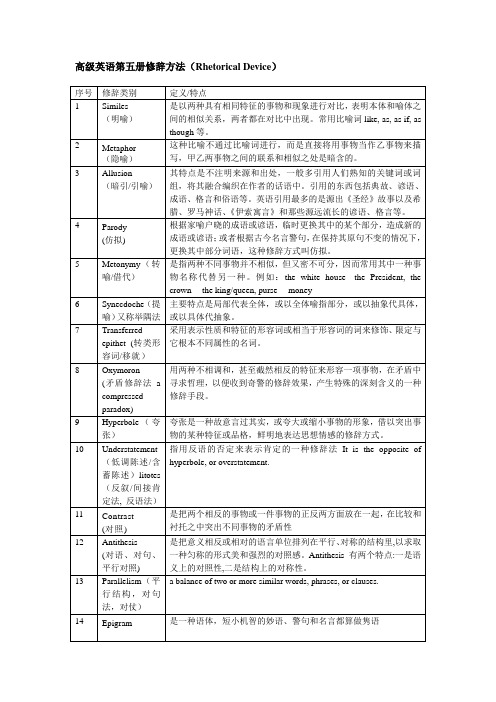
高级英语第五册修辞方法(Rhetorical Device)1. Simile:L1-17: It is something like… behind bars.L1-25: Let us be dissatisfied until from every city hall… a mighty stream.(justice will roll down like waters and righteousness like a mighty stream)L5-5: Same age, same background, but dumb as an ox. (dumb as an ox)L5-50: First he looked at the coat with the expression of a waif at a bakery window. (comparing his longing for the raccoon coat with the expression of a hungry homeless child looking longingly at the bread at a bakery window.)L5-123: It was like digging a tunnel. (comparing his teaching to the hard work of digging a tunnel.)L5-147: I leaped to my feet, bellowing like a bull. (comparing his angry shouts to the bellowing ofa bull)L7-2: …united with others of our country in everything…like the fingers of the hand.(comparing the relationship between black and white to fingers of the hand)L7-10: Yet even then I had been going over my speech...as bright as flame. (comparing each word of his speech to bright flame)L7-16: For in those days I was what they called ginger—colored...like a crisp ginger cookie.(comparing the narrator to a cookie)L7-20: My saliva became like hot bitter glue.L7-21: The boys groped about like blind, cautious crabs... hypersensitive snails. (comparing the black boys to animals)L7-27: A blow to my head as I danced about sent my right eye popping... my dilemma.L7-45: I roiled away as a fumbled football rolls off the receiver’s fingertips...L7-46: 1 was limp as a dish rag.2. Metaphor:L1-5: Psychological freedom. . . physical slavery. (the long night of physical slavery)L1-5: The Negro. . . his own emancipation proclamation. (“signs with the pen and ink of assertive manhood his own emancipation proclamation”)L1-14: … when the unjust… is eliminated. (measurement, a scale of dollars)L1-20: He who hates… ultimate reality. (owning a key to open a door)L1-25: the battering rams of the forces of justice;the junk heaps of historyLet us be dissatisfied until the tragic walls… the forces of justice. (“the tragic walls” and “the battering rams”)L1-27: When our days…into bright tomorrow. (low-hovering clouds of despair; gigantic mountains of evil)L4-3: Killing the Angel in the HouseL4-5: The image of a fishermanL4-7: A room of one’s ownL5-1: There follows an informal essay that ventures even beyond Lamb’s frontier. (comparing the limitation set by Lamb to a frontier)L5-20: My brain, that precision instrument, slipped into high gear. (Mixed metaphor, comparing at the same time the narrator’s brain to a precision instrument and also to a machine that has gears.)L5-34: In other words, if you were out of the picture, the field would be open. (comparing the competing for friendship to an athletic event)L5-98: Maybe somehow I could fan them into flame. Maybe somewhere in the extinct crater of her mind, a few embers still smoldered. (comparing Polly’s mind to the extinct crater of a volcano)L5-115: Poisoning the well: (comparing “the personal attack on a person holding some thesis” to “poisoning the well”)L5-151: The rat. (comparing Petey to a rat)L6-41: I’ve never met anyone… the second time around. (The metaphor of record player is used.)3. Allusion:L1-25: Let us be dissatisfied until that day… none shall be afraid. (a biblical allusion: the 1ion and the lamb shall lie down together; every man will sit under his own vine and fig tree and none shall be afraid)L5-64: We went to the Knoll, the campus trysting place, and we sat down under an old oak… (An implied allusion to Robin Hood, whose trysting place was under a huge oak tree in Sherwood Forest.)L5-138: I was not Pygmalion; I was Frankenstein, and my monster had me by the throat.L10-8: Overnight… surreal episodes…(a sword of Damocles)4. Parody:L10-25: Is our democracy… of liberty? (This is a parody of a line in Patrick Henry’s speech: “Is life so dear or peace so sweet, as to be purchased at the price of chains and slavery?”)5. Metonymy:L4-1: No demand was made upon the family purse. (“purse” stands for money)L4-2: But to show you how little I deserve to be called a professional woman…with my neighbors. (Butcher’s bills stand for meat bought from a butcher. )L5-23: She was, to be sure, a girl who excited the emotions. But 1 was not one to let my heart rule my head. (to let my heart rule my head: Metonymy. “Heart”stands for “feelings and emotions” and “head” for “reason and good sense”.)L5-105: …surgeons have X-rays to guide them during an operation. (X-rays stand for X-rays photographs)L10-2: Anthrax panic… chambers (“Congress” stands for its members)6. Synecdoche:L1-25: Let us be dissatisfied until from every city hall… a mighty stream.city hall (the naming of a part to mean the whole. Here, the naming of the building for the government)L4-2: But to show you how little I deserve to be called a professional woman…with my neighbors. (bread and butter: This set phrase means food and the most important and basic things. )7. Transferred epithet:L1-25: Let us be dissatisfied until the tragic walls… the forces of justice. (the tragic walls)L5-40: I said with a mysterious wink… (the wink was not mysterious)L7-6: our bare upper bodies touching and shining with anticipatory sweat (In “anticipatory sweat”, the adjective “anticipatory “ is a transferred epithet.)L7-25: He kept coming, bringing the rank sharp violence of stale sweat. (the rank sharp violence: Logically rank and sharp modify “stale sweat”, not “violence”.)8. Oxymoron:L12-16: And any man or woman… chalice of Fame. (willingly drinking the poisoned chalice)9. Hyperbole:L5-5: It is not often that one so young has such a giant intellect. (exaggerating for effect)L5-50: … he just stood and stared with mad lust at the coat. (It’s an exaggeration to describe his longing for the coat as “mad lust”)L5-135: You are the whole world to me, and the moon and the stars and the constellations of outer space.L5-135: I will wander the face of the earth, a shambling, hollow-eyed hulk.10. Understatement or litotes:L5-61: This loomed as a project of no small dimensions, and at first 1 was tempted to give her back to Petey. (no small dimensions)11. Contrast:L3-22: A contrast is made between old Shanghai and Shanghai in the 1990s.L8-3: While Oppenheimer was interrupting…. had invented the subject. (an implied contrast)L10-25: How do we… poise? (paranoia vs. poise)12. Antithesis:L1-5: As long as. . . can never be free. (mind vs. body, enslaved vs. free)L1-5: Psychological freedom. . . physical slavery. (psychological freedom vs. physical slavery)L1-7: …love is identified… denial of love (1ove vs. power, a resignation of power vs. denial of love)L1-19: For through violence… but you can’t murder hate. (You may murder a murderer but you can’t murder murder.)L1-25: outer city of wealth and comfort vs. inner city of poverty and despair;wealth vs. poverty (economic);comfort vs. despair(mood, psychology)dark yesterdays vs. bright tomorrows;segregated schools vs. integrated educationon the basis of the content of their character vs. on the basis of the color of their skincontent(substance) vs. color (superficial)character(fundamental) vs. skin (outward appearance)L1-27: When our days…into bright tomorrow.dark yesterday VS. bright tomorrowL5-27: It is, after all, easier to make a beautiful dumb girl smart than to make an ugly smart girl beautiful.beautiful dumb vs. ugly smartL5-50: Back and forth his head swiveled, desire waxing, resolution waning.Desire waxing vs. resolution waningL5-153: Look at me—a brilliant student, a tremendous intellectual, a man with an assured future.Look at Petey—a knot-head, a jitterbug, a guy who’ll never know where his next meal is coming from.Brilliant, intellectual and assured vs. knot-head, jitterbug and never know where his next meal is coming from”13. Parallelism:L1-6: … confrontation of the forces… the status quo.forces of power demanding change(present participle)forces of power dedicated to the preserving of the(past participle) status quoL1-8: What is needed… and anemic.power without love is reckless and abusivelove without power is sentimental and anemicL1-8: Power at its best… against love.power at its best love implementing demands of justicejustice at its best power correcting against loveL1-10: And, in the thinking of that day…moral fiber.the absence of vs. a want ofworldly goods vs. (qualities)L1-19: For through violence… but you can’t murder hate.Three sentences “T hrough violence you may murder… but you can’t murder…”L1-20: And I have seen too much hate…. too great a burden to bear.I have seen too much hateI’ve seen too much hate onI’ve seen hate on…too many Klansmen…L1-25: There are 11 sentences beginning with “let us be dissatisfied until” and two short sentences of “let us be dissatisfied”.L12-5: The armies of… The legions of…The armies of… are marshaled against it.The legions of… will march against it.L12-16: A novelist’s characters… celebrity.a novelist’s characters hope for immortalitya profile journalist’s for celebrityL12-24: It is the disrespect… to preserve.(disrespect) for powerorthodoxiesparty linesideologies…;that I would like to celebratethat I urge all to preserve14. Epigram:L1-20: He who hates… ultimate reality.15. Paradox:L1-18: Without recognizing this…that don’t explain.paralleled paradoxes: solutions that don’t solveanswers that don’t answerexplanations that don’t explainL1-27: When our days…into bright tomorrow. (to make a way out of no way)16. Chiasmus:L1-9: It is precisely this collision… of our times. (immoral power vs. powerless morality)L6-6: Absence of evidence is not evidence of absence.17. Anaphora:L1-25: let us be dissatisfied…18. Alliteration:L1-25: Let us be dissatisfied until that day… none shall be afraid. ( lion, lamb, lie)L7-2: Live with your head in the lion’s mouth...or bust wide open. (death and destruction)L7-9: Some of the others tried to stop them…slipping and sliding over the polished floor.(slipping and sliding)L11-23: Uncle Ben would let out his belt—a fancy Western belt with steer heads and silver buckle —with a. (snap and a sigh)L11-24: Bones would be thrown to dogs,…daintily and disgustedly picking their padded feet through the snow, … the sky like blood. (daintily and disgustedly)L12-5: For the goal… that may sound. (factual and fictional)L12-5: The armies of… The legions of… (“Marshal” and “march”)19. Onomatopoeia:L3-14: clickRhetorical Devices一、明喻(simile)是以两种具有相同特征的事物和现象进行对比,表明本体和喻体之间的相似关系,两者都在对比中出现。
英语修辞手法小结
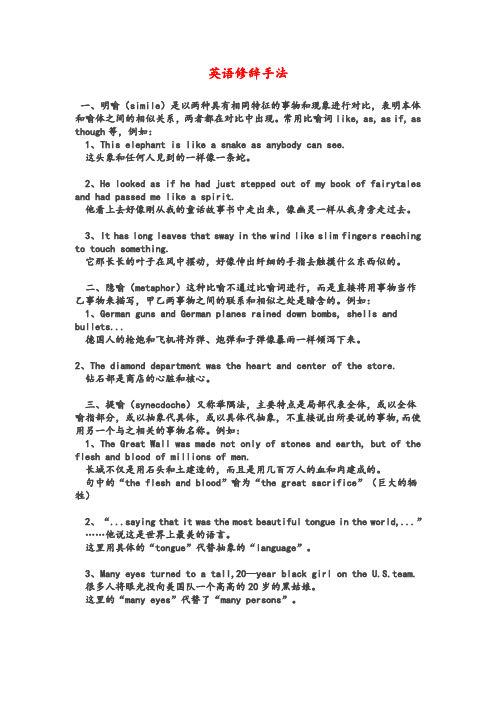
英语修辞手法一、明喻(simile)是以两种具有相同特征的事物和现象进行对比,表明本体和喻体之间的相似关系,两者都在对比中出现。
常用比喻词like, as, as if, as though 等,例如:1、This elephant is like a snake as anybody can see.这头象和任何人见到的一样像一条蛇。
2、He looked as if he had just stepped out of my book of fairytales and had passed me like a spirit.他看上去好像刚从我的童话故事书中走出来,像幽灵一样从我身旁走过去。
3、It has long leaves that sway in the wind like slim fingers reaching to touch something.它那长长的叶子在风中摆动,好像伸出纤细的手指去触摸什么东西似的。
二、隐喻(metaphor)这种比喻不通过比喻词进行,而是直接将用事物当作乙事物来描写,甲乙两事物之间的联系和相似之处是暗含的。
例如:1、German guns and German planes rained down bombs, shells and bullets...德国人的枪炮和飞机将炸弹、炮弹和子弹像暴雨一样倾泻下来。
2、The diamond department was the heart and center of the store.钻石部是商店的心脏和核心。
三、提喻(synecdoche)又称举隅法,主要特点是局部代表全体,或以全体喻指部分,或以抽象代具体,或以具体代抽象,不直接说出所要说的事物,而使用另一个与之相关的事物名称。
例如:1、The Great Wall was made not only of stones and earth, but of the flesh and blood of millions of men.长城不仅是用石头和土建造的,而且是用几百万人的血和肉建成的。
- 1、下载文档前请自行甄别文档内容的完整性,平台不提供额外的编辑、内容补充、找答案等附加服务。
- 2、"仅部分预览"的文档,不可在线预览部分如存在完整性等问题,可反馈申请退款(可完整预览的文档不适用该条件!)。
- 3、如文档侵犯您的权益,请联系客服反馈,我们会尽快为您处理(人工客服工作时间:9:00-18:30)。
2. 英语比喻的运用与其风俗习惯密切相关。对英国人和大部分的西方人来说,狮子是“百兽之王”。从“regal as a lion”(狮子般庄严)、majestic as a lion(像狮子一样雄伟)等用语可以看出狮子享有很高的声誉。再比如,英美人对狗钟爱有加,有关dog的习语很多。诸如:big dog(保镖);Love me,love my dog.(爱屋及乌);lazy dog(懒汉);sea dog(老练水手)等等。他们也常以狗的形象来比喻人的行为。如Old dog will not learn new tricks.(老人学不了新东西。)等等。
头韵 (the alliteration )
头韵即连续数个单词的头音或头字母相同,这种现象在英语中常见。例如:
I felt sick, and ever since then they have been testing and treating me.(打那时起,他们就一直不断地对我进行体检和治疗。)(testing 和treating 用在这里是为了取得一种文字的音乐美的效果。)
Michael's dedication, determination and discipline was a coach's dream.(迈克尔的投入、执着、自律正是每个教练梦寐以求的。)(作者在这里运用押头韵突出了主人公不达目的不罢休的决心。)(大学英语第二册第五课课文A)
矛盾修辞法(Oxymoron)
(3)Black sheep.害群之马。(sheep译为“马”)
2.一种动物形象转换成人的形象,则主要是依据动物自身的习性、特点以及该词汇的内涵和具体的语境而定。例如:
(1)“Don’t be scared, Chickens!”came her voice with teasing gaiety.“别害怕,胆小鬼们!”她开玩笑地说。(chickens译为“胆小鬼”)
1. 英语比喻在运用上具有明显的地域特征。英国是一个海洋国家,所以诸如航海、船只和鱼类等的形象在英国人的用语中出现频率相对较高。如: Gut no fish till you get them.(鱼未捉到不要忙着取肠肚,相当于汉语的“不要过早打如意算盘”);all at sea(全在海里,相当于汉语的“不知所措”)等。
3.转喻(the metonymy)
转喻是比隐喻更进一步的比喻,它根本不说出本体事物,直接用比喻事物代替本体事物。例如:The buses in America are on strike now.美国的公共汽车司机正在罢工(这里buses 喻指司机drivers)。英语中一些鸟兽鱼虫的名字,除本义外,常可转借喻人,形象生动,意味隽永。例如:She is a social butterfly.她是一个交际花(以虫喻人)。
所谓矛盾修辞法,就是把意思上回响矛盾互相排斥的词语紧密地联系在一起,来描述一个事物,或表达一种思想,说明一个道理,或寻求一个哲理。,用这种方法,语言精炼简洁,富有哲理,并产生强大的逻辑力量,产生一种出人意料,引人入胜的效果。
1.明喻(the simile)
明喻通常是把被比喻的“本体”和用以比喻的“喻体”同时说出,说明本体事物像喻体事物,表示“好像”意思的比喻说法就叫明喻。如:as clear as crystal清如水晶。
2.隐喻(the metaphor)
隐喻是根据两个事物间的某些共同的特征,用一事物去暗示另一事物的比喻方式。本体和喻体之间不用比喻词,只是在暗中打比方。如:Argument is war.实际上argument和war是两种不同的事物,前者是口语谈论,后者是武装冲突。但argument和war都可能十分激烈,因此该句用战争(war)来暗指辩论(argument)激烈的程度。又如:He has a heart of stone.他铁石心肠。还有许多隐喻成语如:to teach fish to swim班门弄斧;to plough the sand白费力气 。
3. 英语比喻具有较鲜明的文化背景。英语民族大多信奉基督教,而且受到希腊、拉丁古典语言的影响,因此,《圣经》和希腊、罗马神话的典故时常在其用语中出现。如:Achilles‘ heel(致命的弱点);the apple of one‘s eye(掌上明珠;心爱之物)等。
4. 不同的民族有不同的语言习惯,英汉两个民族运用比喻的习惯也不同,有时比喻中的同一个形象在两种语言中可能会产生不同的联想。例如: like mushrooms雨后春笋(不宜译作“犹如蘑菇一样多”)。西方人对bat(蝙蝠)无好感,提到蝙蝠,人们就会想到丑陋、凶恶、吸血动物的形象。英语中有as blind as a bat(瞎得跟蝙蝠一样,眼力不行,有眼无珠),have bats in the belfry(发痴;异想天开)。而对中国人来说,蝙蝠是吉祥、健康、幸福的象征。
在以上例子中,动物形象的相互转换主要是由于文化传统、风俗习惯以及民族的思维定式的差异造成的,使用的是词汇的概念含义。而动物形象与人的形象之间的转换则是根据该动物形象所处的具体的语境和由其概念含义所引发的关联含义来决定的。
三、了解英语比喻的特点
由于英语中比喻辞的大量存在,加之英汉两个民族在历史条件、风俗习惯和生活环境、美学观念上的差别,认真研究和找出英语比喻的特点是十分必要的。那么,英语比喻在运用上有哪些特点呢?
英语比喻中的趣味性在动物比喻中的体现
比喻这种修辞格在英语中的应用常见而广泛。它能使语言更加形象生动、鲜明突出。并非所有的英语比喻都能直译为相应的汉语。如果说一概望文生义,就难免出错。
比如动物比喻(Animal Metaphors)在英汉两种语言中均有广泛的使用,它作为一种重要的修辞手法,创造出生动、鲜明的形象,能产生良好的艺术效果。然而,由于文化背景、思维方式的不同,人们对动物比喻的正确理解和翻译存有障碍。我们如能注意以下两个方面就可以更准确地把握句子的意思,同时也不至于闹出笑话:
fame is like a dog chasing his own tail… ””…and their ride on the express elevator to the top is a blur.””Fame’s spotlight can be hotter than a tropical jungle…” 接下来我们谈谈英语中几种不同的比喻
4.借喻(figurativeness)
借喻是用一个事物来指代与它关系密切的另一个事物。借喻中只出现喻体,而不出现本体,即用喻体替代本体。借喻中使用替代词的意义是它的转义,而不是本义。它着眼于两种事物之间的联系,而非二者的相似性。例如:He was most furious when he found that his wife had kept a secret purse. 他发现妻子存有私房钱,非常愤怒。这里的secret purse指与之有密切联系的 “私房钱”。secret purse与“私房钱”的联系在于:钱包是用来装钱的。
其他常见修辞手法
夸张(the exaggeration)
把事物的特征,有意地加以夸大或缩小,就叫夸张,即采用“言过其实”的说法,使事物的本质特征更好地呈现出来。英语中夸张修辞格,应用极为频繁。夸张的功能是突出事物的本质特征,因而给人强烈印象或警悟、启发 。例如:
Most American remember Mark Twain as the father of Huck Finn's idyllic cruise through eternal boyhood and Tom Sawyer's endless summer of freedom and adventure.(在大多数美国人的心目中,马克.吐温是位伟大作家,他描写哈克.费恩永恒的童年时代中充满诗情画意的旅程和汤姆.索亚在漫长的夏日里自由自在历险探奇的故事。)(eternal和endless都是夸张用语,表示哈克.费恩童年时期田园般的旅游和汤姆.索亚夏日里自由自在历险探奇的故事都已成为永恒不朽之作。)
拟人(the personifjcation)
所谓拟人就是把无生命的事物当作有生命的事物来描写,赋予无生命之物以感情和动作或是把动物人格化 。例如:
The first day of this term found me on my way to school, beautiful flowers smiling and lovely birds singing in the wood.(唱.)(采用拟人化的修辞手法使句更为生动,表达更富情感.)
(2)In the city I was nothing, but there in the countryside I was considered a big fish.在城里我还不是什么人物,但是在乡下我却被认为是个了不起的人物。(fish译为“人物”)
(3)Don’t listen to her gossip; she is a cat.别听她搬弄是非,她是个心地恶毒的女人。(cat译为“心地恶毒的女人”)
5.提喻(synecdoche)
提喻与借喻相似,也是用一种事物替代另一事物,句中只出现喻体,而不出现本体。但是,借喻中二事物有密切的联系,而提喻中两事物则体现于同一体中,是部分与整体的关系,是“包含”与“覆盖”的关系。例如:Yet there were some stout hearts who attempted resistance.但是也有些胆大的人试图抵抗。用人的一部分heart代替人,是用部分代替整体的情况。
